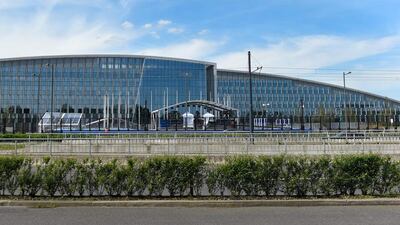After his call in Saudi Arabia for a renewed effort to defeat the “foot soldiers of evil”, Donald Trump will seek further support for his campaign against global terrorism when he meets other heads of state at a Nato summit in Brussels this week.
European leaders awaiting the arrival of the new US president in the Belgian capital will seek a reaffirmation of Washington’s commitment to the western alliance. Although Mr Trump qualified his previous campaign trail outburst that Nato was “obsolete” after he entered the White House, the other summit participants will be looking for proof that the alliance’s leading power is still prepared to underwrite their mutual security.
Much of the business to be transacted in Brussels builds on measures agreed in previous years. Ongoing military deployments in Central and Eastern Europe are intended to deter a potential threat from Russia, which is still at loggerheads with Nato over the frozen conflict in Ukraine. An “Enhanced Forward Presence” of four multinational battalions in Estonia, Latvia, Lithuania and Poland will be completed next month. Aircraft have also been stationed in Romania to support Nato’s Southern Air Policing mission.
Although the alliance is not formally part of the US-led coalition fighting ISIL, surveillance aircraft are supporting operations in Syria and Iraq and training programmes are being run for Iraq’s armed forces. In addition, the creation of a new intelligence unit at Nato’s Joint Force Command in Naples to monitor events in the Middle East and North Africa signals a deeper concern over instability in Europe’s southern neighbourhood.
Despite the current accord on these and other commitments, doubts over Washington’s continued faith in the alliance will need to be addressed. Mr Trump’s previously professed scepticism about the value of Nato appeared to stem from a belief that Russia was no longer a threat to Europe, that the Europeans did not do enough to fight terrorism and that the alliance was placing an unfair financial burden on the United States.
Although Mr Trump has conceded that Nato is improving its counterterrorism efforts, he is seeking agreed “national plans” for increased defence spending by some of the more recalcitrant countries. Slow progress in fulfilling a requirement that member states should spend at least 2 per cent of their GDP on defence has been a continual source of friction. At present, only the US, the UK, Greece, Poland and Estonia are meeting the required target, with Romania, Latvia and Lithuania expected to join this group soon.
The US president’s views on the perceived Russian threat are less easy to discern. His apparent ambivalence over Nato’s Article 5 obligation – that an attack against one member state is an attack against all – has led to fearful speculation in some European capitals that the current US administration would not come to their aid in the event of Russian aggression. Although US defence secretary James Mattis, who will travel with Mr Trump to Brussels, has described Article 5 as a “bedrock commitment”, other leaders at the summit will be looking for clear statement of support from the president himself.
Aside from securing a welcome commitment to mutual defence, European leaders are privately resigned to the likelihood that the White House will maintain a capricious foreign policy based on tactical dealmaking rather than a coherent global strategy. Reports that Jens Stoltenberg, Nato’s secretary general, privately complained of Mr Trump having only a “12-second attention span” after the two met last month have been denied in Brussels.
The Europeans will nevertheless feel emboldened to resist demands for more burden sharing, secure in the knowledge that Mr Trump is facing a growing political crisis over alleged links between his presidential campaign and the Russian government. With political populism in Europe seen off for the time being and the continent’s economies showing signs of a tentative recovery, their willingness to devote more money to defence will be tempered by their awareness of the president’s domestic tribulations.
Transatlantic disagreements over defence spending partially stem from differing interpretations over the most effective ways of countering terrorism and failed states.
Although Germany spends only 1.2 per cent of GDP on its military budget, Angela Merkel’s government emphasises its significant spending on overseas development aid and readiness to accept refugees displaced by conflicts in neighbouring regions. The Europeans also claim that instability in the Middle East and Africa poses a direct threat that requires them to help improve local governance and train and fund local security forces.
In return for some movement on defence spending, Mr Trump will probably be persuaded at Brussels to offer necessary reassurance on Russia and understanding that enduring security requires the deployment of other tools aside from raw military power.
A ceremony marking the 9/11 attacks as the only occasion in Nato’s history when Article 5 was invoked will also be held at the summit. The commemoration will no doubt remind the US president that Nato remains valuable even when there are disagreements over how the bill is shared.
Stephen Blackwell is an international politics and security analyst

